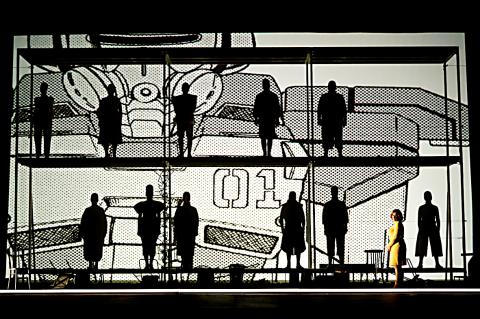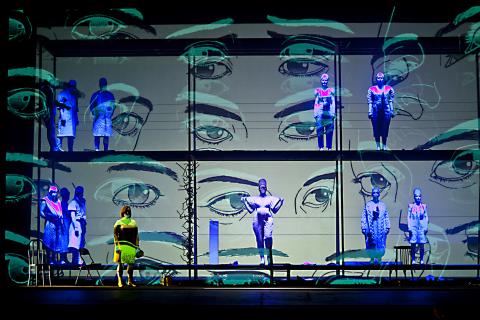This weekend’s Taiwan International Festival of Arts production at the National Theater, War Sum Up (迷幻戰境), really puts the “international” into the National Theater Concert Hall’s programming for its six-week long festival.
The 2011 avant-garde opera — stress on avant-garde — was produced by the Denmark-based “laboratory” Hotel Pro Forma and the Latvian National Opera. It was conceived and directed by Hotel Pro Forma’s artistic director Kirsten Dehlholm, with a libretto taken from Japan’s classic Noh theater texts by her long-time collaborator Willy Flindt, and sung in Japanese by members of the Latvian Radio Choir, with a set and visuals inspired by the drawings of manga artist Hikaru Hayashi and a score that mixes classical, electronic and pop music. Chinese surtitles will be provided for the three Taipei shows.
The score’s composers came from across Europe: the English art-pop ensemble the Irrepressibles, Latvian composer Santa Ratniece and Frenchman Gilbert Nouno.

Photo courtesy of Gunars Janaitis
The idea of Danes creating a Noh-centric opera is not quite as strange as it sounds once you learn that the 73-year-old Flindt studied Japanese language and literature at the University of Copenhagen, studied Japanese language, theatrical history and music anthropology at Tokyo’s Waseda University and is a qualified Noh actor.
The 30-year-old Hotel Pro Forma, founded by Dehlhom and Flindt, bills itself as an international arts performance laboratory and producers of visual music performances and installations. It has created more than 50 works, many of them operas where the visuals often outweigh the texts, and that is certainly true of War Sum Up.
Critics in several countries have raved about War Sum Up, described as a “manga opera on the nature of war,” which focuses on both the glorification of war and its brutality and serves as a plea for peace. However, do not expect a linear story; it is a series of stories about the three main characters: a soldier suffering from post-traumatic stress disorder, a warrior who died in battle and has become a ghost, and a female spy who is forced to turn into a superwoman to survive being captured.

Photo courtesy of Gunars Janaitis
The narrator, a mysterious woman in a yellow suit, also serves as the Gamemaster who starts wars.
Singers from the Latvian Radio Choir, dressed as futuristic warriors, frame the action.
Subtitled Music, Manga, Machine, the 80-minute War Sum Up comes with some caveats: latecomers will not be admitted, there is no intermission, and there is adult subject matter including nudity, smoke and bloody scenes, so only those over 12 years of age will be admitted.

In the March 9 edition of the Taipei Times a piece by Ninon Godefroy ran with the headine “The quiet, gentle rhythm of Taiwan.” It started with the line “Taiwan is a small, humble place. There is no Eiffel Tower, no pyramids — no singular attraction that draws the world’s attention.” I laughed out loud at that. This was out of no disrespect for the author or the piece, which made some interesting analogies and good points about how both Din Tai Fung’s and Taiwan Semiconductor Manufacturing Co’s (TSMC, 台積電) meticulous attention to detail and quality are not quite up to

April 21 to April 27 Hsieh Er’s (謝娥) political fortunes were rising fast after she got out of jail and joined the Chinese Nationalist Party (KMT) in December 1945. Not only did she hold key positions in various committees, she was elected the only woman on the Taipei City Council and headed to Nanjing in 1946 as the sole Taiwanese female representative to the National Constituent Assembly. With the support of first lady Soong May-ling (宋美齡), she started the Taipei Women’s Association and Taiwan Provincial Women’s Association, where she

Chinese Nationalist Party (KMT) Chairman Eric Chu (朱立倫) hatched a bold plan to charge forward and seize the initiative when he held a protest in front of the Taipei City Prosecutors’ Office. Though risky, because illegal, its success would help tackle at least six problems facing both himself and the KMT. What he did not see coming was Taipei Mayor Chiang Wan-an (將萬安) tripping him up out of the gate. In spite of Chu being the most consequential and successful KMT chairman since the early 2010s — arguably saving the party from financial ruin and restoring its electoral viability —

It is one of the more remarkable facts of Taiwan history that it was never occupied or claimed by any of the numerous kingdoms of southern China — Han or otherwise — that lay just across the water from it. None of their brilliant ministers ever discovered that Taiwan was a “core interest” of the state whose annexation was “inevitable.” As Paul Kua notes in an excellent monograph laying out how the Portuguese gave Taiwan the name “Formosa,” the first Europeans to express an interest in occupying Taiwan were the Spanish. Tonio Andrade in his seminal work, How Taiwan Became Chinese,